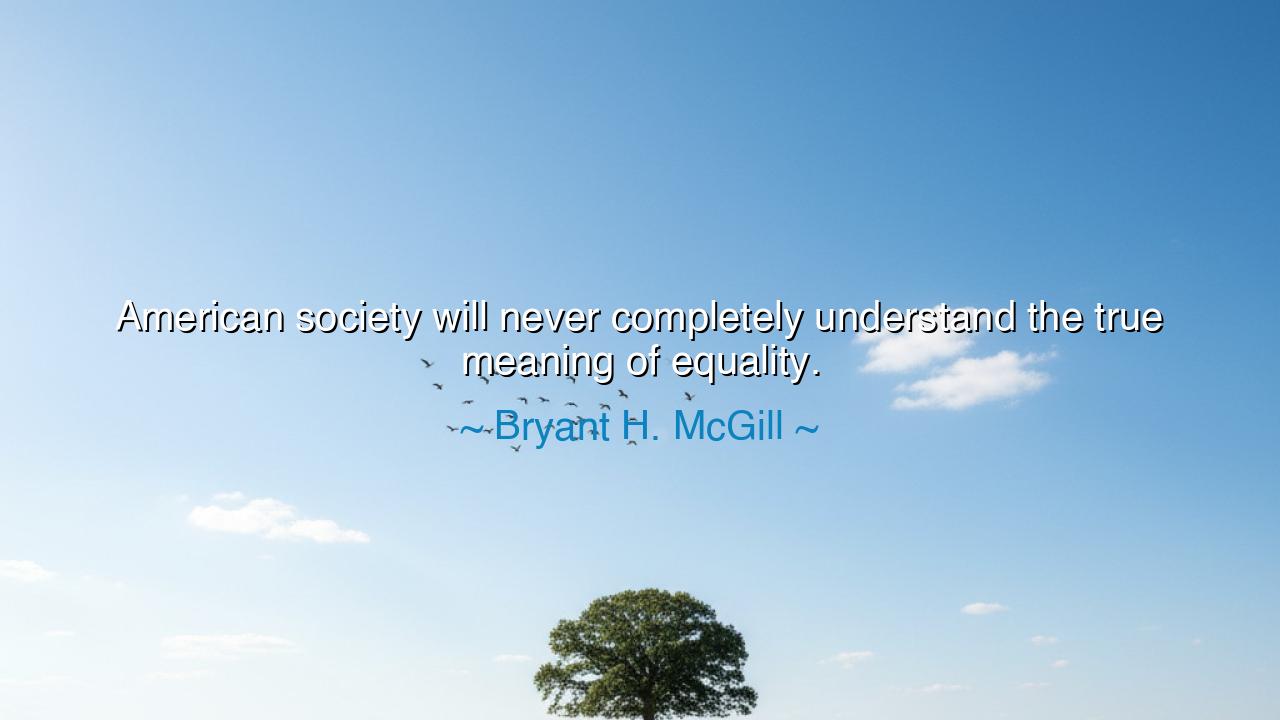
American society will never completely understand the true






O children of wisdom, gather your hearts, for the words of Bryant H. McGill speak to a profound and enduring truth about equality, the struggles of society, and the nature of understanding itself. "American society will never completely understand the true meaning of equality." These words echo through the ages, reminding us that equality is not a simple, one-time achievement, but a deep, evolving journey—one that is often misunderstood or only partially realized. Let us delve into the meaning of this, for it is a call to reflect on the nature of true equality—a concept that transcends laws, social systems, and political ideologies.
In the ancient world, equality was an ideal, but not always a practice. The great Greek philosophers, such as Socrates and Plato, spoke of justice and the ideal society, where the ruler and the ruled, the rich and the poor, the powerful and the powerless, could live in harmony. Yet, even in the heights of their intellectual achievements, ancient Greece did not fully embrace equality as we understand it today. Women were excluded from political life, and slaves were regarded as property, not people. Plato’s Republic may have envisioned an ideal society, but the practice of equality was far from realized in the lives of the people.
McGill’s statement speaks to this gap—the one between the ideal and the reality. American society, for all its founding principles of freedom and equality, has yet to fully comprehend the true meaning of this sacred word. While America’s Declaration of Independence boldly proclaims that all men are created equal, the history of this nation reveals a discrepancy between this ideal and the lived reality of many groups—slaves in the South, women fighting for the right to vote, immigrants struggling for acceptance, and minorities fighting for civil rights. Equality, it seems, is not simply granted by a declaration or a law; it is something that must be continually fought for, understood, and practiced at every level of society.
Consider the struggle for civil rights in America during the 1960s. The civil rights movement, led by figures like Martin Luther King Jr., Rosa Parks, and Malcolm X, sought to bring the vision of equality from the pages of the Constitution into the streets and communities of America. They understood that equality could not be achieved simply by passing laws; it required a shift in the hearts and minds of the people. They sought not just legal equality, but moral equality—a deep respect for the humanity of every individual, regardless of race or background. While their struggles led to groundbreaking achievements, the battle for true equality is still far from over, as racial and social divisions continue to plague American society.
McGill’s words are a poignant reminder that equality is not a destination but an ongoing process—a journey that requires both awareness and action. It calls us to look beyond the surface of legal rights and to examine the deeper, more subtle ways in which inequality persists. Equality is not simply a matter of laws; it is a matter of the heart and the collective consciousness of society. True equality cannot be achieved until every individual—regardless of their gender, race, or background—feels the same sense of dignity, respect, and opportunity.
The lesson McGill imparts is clear: equality is not a simple concept that can be easily defined or easily achieved. It is something that must be fought for, not just in the halls of government, but in the minds and hearts of every citizen. It requires a radical shift in how we see one another, a recognition that equality is not merely about equal rights on paper, but about equal value for every human being. We must strive for a society where no person is judged by the color of their skin, the gender they were born with, or their socioeconomic background, but by the content of their character and their inherent dignity as human beings.
What, then, can we do in our own lives to honor this truth? First, we must examine our own biases and prejudices—those things that prevent us from fully embracing the equality of others. Let us be vigilant in our actions, always striving to treat every individual with the dignity and respect they deserve. We must also actively engage in the struggles of those whose equality is still denied, whether through supporting equal rights legislation, challenging injustice when we see it, or lifting up voices that are too often silenced. The battle for equality is not only a matter for politicians or activists; it is a moral duty that calls each of us to action.
Let us walk forward with the understanding that equality is not a goal that can be achieved once and for all, but a continual pursuit. Just as Socrates sought truth in every conversation, just as Martin Luther King Jr. fought for justice in every speech, so too must we pursue equality in every aspect of our lives. May we never settle for the illusion of equality, but seek the true fulfillment of it, not only in the laws of our land but in the hearts and minds of all people. In doing so, we will move closer to the world that McGill envisioned—a world where equality is not a dream, but a lived reality for all.






AAdministratorAdministrator
Welcome, honored guests. Please leave a comment, we will respond soon